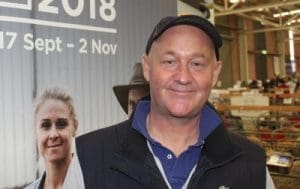
AWI CEO Stuart McCullough at the Australian Sheep and Wool Show.
AUSTRALIA’s wool growers are being asked to state their priorities and ideas on keeping wool profitable via an online survey that will be open until Sunday August 16.
Australian Wool innovation and its Woolgrower Consultation Group (WCG) want growers to complete an online survey as an integral part of ‘Wool 2030’ – a long-term 10-year strategic plan.
AWI said the results of the survey will play a major role in developing Wool 2030. The WCG and their ‘next generation’ representatives are overseeing the project, which was one of the recommendations arising from AWI’s 2018 Review of Performance and Governance.
The survey seeks to gather views on where the industry should be in 2030, what opportunities and threats the industry faces over that time, and what key activities need to be undertaken to ensure the industry’s prosperity, AWI said. The survey should only take 15-20 minutes to complete. Click here to do the survey.
AWI said the survey seeks to gather views on where the industry should be in 2030, what opportunities and threats the industry faces over that time, and what key activities need to be undertaken to ensure the industry’s prosperity. The survey should only take 15-20 minutes to complete.
AWI chief executive officer Stuart McCullough said the whole purpose of the plan is to keep wool profitable and sustainable.
“AWI wants to hear from growers from across Australia on their priorities and ideas to ensure wool remains a profitable land use choice.”
The WCG and their next generation representatives recently completed a series of five webinars exploring key areas to be included in ‘Wool 2030’.
AWI said the plan is for the benefit of Australian wool growers as they are AWI’s primary stakeholders and levy-payers. It will principally cover issues related to wool production, but also some downstream activities in which wool growers have a strong stake, such as traceability systems.
You can learn more about the project at https://2030.wool.com/. You can also sign up to be kept informed of developments in the project.
AWI said its approach to developing the Wool 2030 plan has had to be adjusted in the face of the Covid-19 outbreak, which has restricted its team’s ability to run workshops and other face-to-face events to seek input. It is hoped that if and when travel restrictions permit, it will be possible to hold some regional workshops in coming months, AWI said.

For the wool industry to survive, we need to address all welfare issues. The main issue is mulesing. The majority of wool growers would agree, although find it difficult to understand, there is a definite genetic solution. With the correct ram selection and sound joining advice in one, maybe two generations, you will do what you thought was impossible.!The new sheep classing system is very exciting and illustrates practical genetics. Your basic understanding of genetics will increase dramatically. The younger wool growers will discover its profitability. As many people know today, some genes are active and some inactive. The trick is how to switch the useful ones on. Michael Day, Trangie.
The only threat to the wool industry over the next 10 years is Australian Wool Innovation. Their complete persistence not to listen to the trade will destroy this industry. AWI has to be dismantled as soon as possible.
Merino breeders have to get the hard collagen out of their sheep which will then allow them to stop mulesing, lift their lambing percentages and eradicate flies in their sheep. No need for chemicals that flies have resistance to anyway. They need to produce a sheep that is comfortable in it’s environment, has efficient feed conversion rates and is easy to shear.
This $100 million expenditure by AWI to keep the status quo needs a royal commission. AWI is one of the greatest examples of how politics and self-interest warps an industry. The culture is so deeply embedded that the only solution is to wind AWI up.
The Prime Minister recklessly antagonising China is without doubt the major threat to the wool industry.